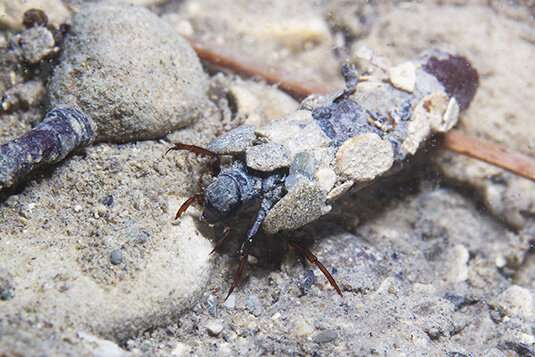Study: Global warming has caused an 80% drop in freshwater insect populations over 40 years

According to a long-term study in a nature reserve in the State of Hesse, environmental changes attributable to global warming have resulted in an 80% drop in the sizes of freshwater insect populations over the past 40 years.
The Breitenbach, a headwater stream located in the hills of Eastern Hesse, is one of the most intensively investigated watercourses in the world. For more than 40 years, researchers have been following the fortunes of its insect communities. The stream lies within the boundaries of a nature reserve, and its relative remoteness minimizes the direct impact of humans on its flora and fauna. However, a new study based on the data accumulated over this period by LMU zoologist Dr. Viktor Baranov, Rüdiger Wagner (Kassel University) and Professor Peter Haase (Senckenberg Institute and Natural History Museum, Frankfurt), together with co-authors from the universities of Frankfurt, Essen-Duisburg and Umea, provides ample grounds for concern. The analysis, which appears in the journal Conservation Biology, shows that insect communities in the Breitenbach have diminished in abundance by more than 80% over the past four decades. The authors link this alarming decline to climate change.
Between January 1969 and December 2010, samples of freshwater insects were collected weekly from a stationary trap. By this means, the total numbers of insects (mayflies, stoneflies and caddisflies) that emerged along this stretch of the stream could be ascertained. In addition, the temperature and discharge rate of the stream were measured daily. This unique dataset formed the basis for the study, which was designed to assess the impact of climate change on the ecosystem of a small, low-mountain stream, the most common riverine system found in Central Europe.
The results show that the average water temperature in the Breitenbach has risen by 1.8°C since 1969, while the annual numbers of emerged insects has fallen by 81.6%. "In contrast to this overall decline in insect abundance, we noted an increase in biodiversity in the Breitenbach—in other words, there are fewer individuals, but more species," says Haase. The researchers attribute this marked alteration to a shift in the stream's flow regime. "Forty-two years ago, this stretch was a classical headwater stream. Owing to the rise in temperature in the meantime, it now displays features that are characteristic of a downstream segment, in which one can expect to find a larger number of species," Baranov explains.
However, the data also show that this trend toward increased diversity can go into reverse. Species counts for the last two decades considered demonstrate that species richness is falling again. And here too, alterations in the climate appear to play an important role. Since 1990, drier years have dominated the record, with correspondingly negative consequences for insects. "As this climatic trend is set to continue, one must assume that its negative effects on riverine insect communities will too," says Baranov.
"Our study shows that, even in areas in which the direct anthropogenic impact is relatively limited, climate change has already had a significant impact on aquatic ecosystems. It also underlines the complexity of nature, which does not react to change in a linear fashion. Such complexity can be fully understood only with the aid of long-term datasets, like those collected for the Breitenbach. If we had had to rely on short-term investigations or modelling studies, we would have come to very different conclusions," says Haase.
More information: Viktor Baranov et al. Complex and nonlinear climate‐driven changes in freshwater insect communities over 42 years, Conservation Biology (2020). DOI: 10.1111/cobi.13477
Journal information: Conservation Biology
Provided by Ludwig Maximilian University of Munich


















